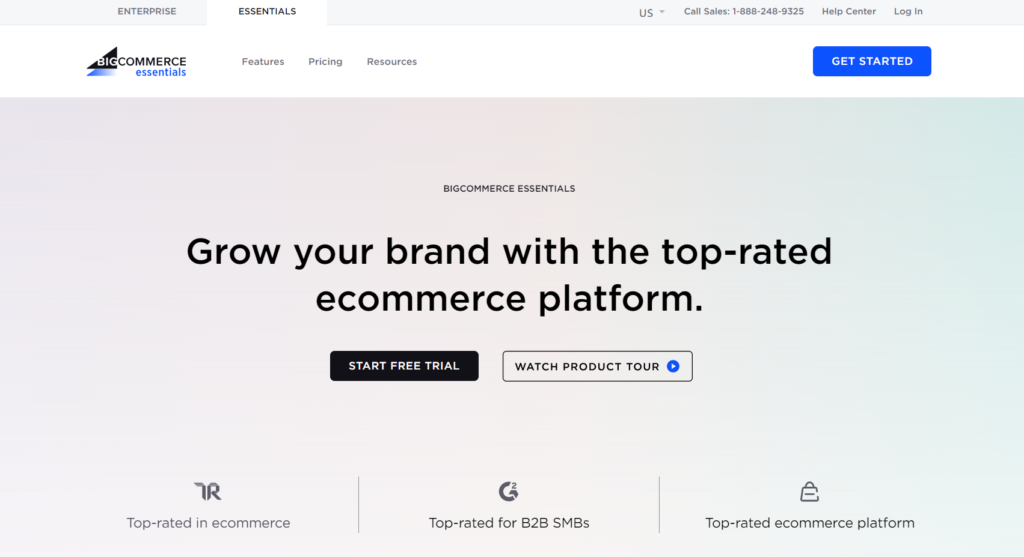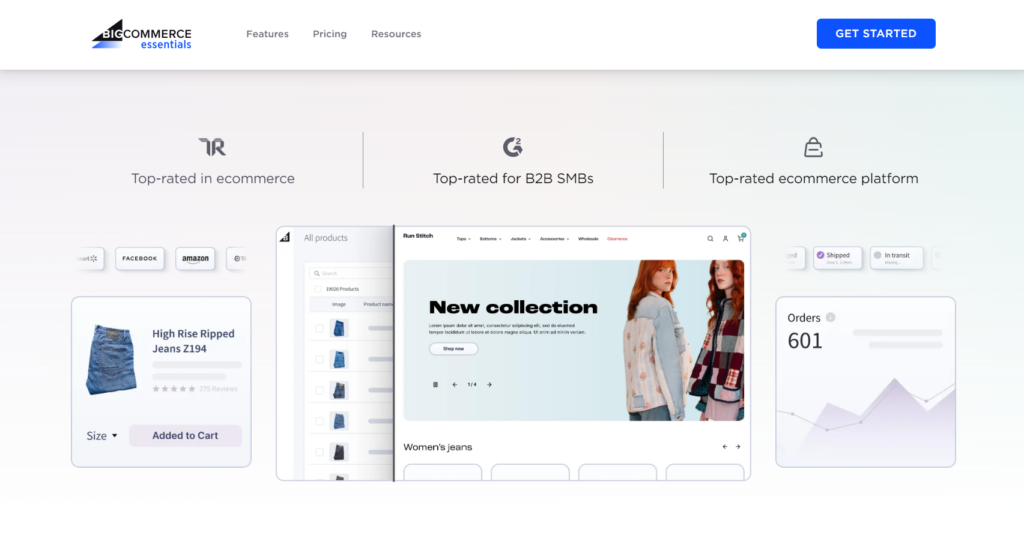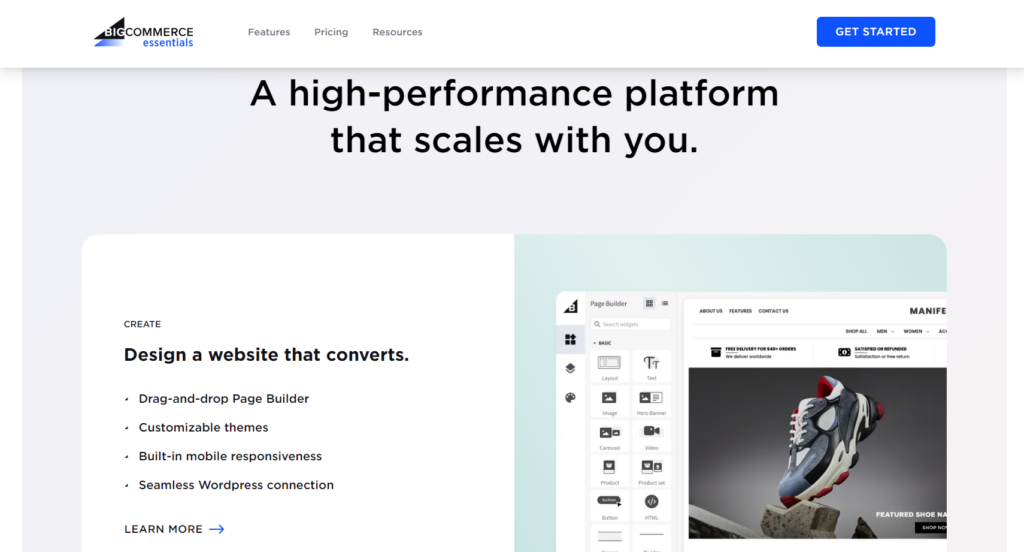Table of Contents
Our Verdict

Imagine you’re about to embark on an exciting journey to build your dream online store. Are you aware that the path you choose can make all the difference?
Picture this: You’re setting up your store, and everything just clicks. The interface is intuitive, and with over 8,000 apps at your fingertips, you can customize your store to your heart’s content. This is the reality you get when you choose Shopify. Shopify is like having a friendly guide by your side, making the journey smooth and enjoyable.
Do you love simplicity and efficiency? Shopify’s user-friendly design ensures you spend less time figuring things out and more time growing your business.
Do you need a specific feature? There’s probably an app for that! With such a vast selection, you can tailor your store exactly how you want it.
On the other hand, make BigCommerce your powerhouse if you’re a tech-savvy entrepreneur who loves diving into features and optimizing every aspect of your store. Get access to built-in tools that give you a competitive edge right out of the box.
Do you prefer having everything you need without relying on third-party apps? BigCommerce’s robust built-in features mean you’re ready to go from day one.
Want to dominate search engine rankings? BigCommerce’s strong SEO capabilities help your store shine in search results, attracting more customers.
Wait! Don’t be too eager to choose without finding out more about these great online stores. Are you ready to dig deeper? Read on till the end.
Why Choose Shopify

Who Shopify Is Best For
Consider Shopify if you:
- Value ease of use and want a user-friendly platform.
- Need extensive customization options through a vast app store.
- Prefer a quick setup with minimal technical hassle.
- Plan to scale your business and need a platform that grows with you.
- Want 24/7 customer support to assist you anytime.
- Operate a dropshipping business and need seamless integrations.
- Seek a reliable and secure e-commerce solution with robust features.
MORE >>> WordPress Website Builder Review
Who Shopify Is Not Right For
Look for other alternatives to Shopify if you:
- Need extensive built-in features without relying on third-party apps.
- Prefer a platform with stronger SEO tools out of the box.
- Want lower transaction fees without using a specific payment gateway.
- Require advanced customization that might need more technical expertise.
- Operate a large enterprise and need highly specialized solutions.
- Seek a platform with more flexibility in terms of coding and development.
- Have a limited budget and need a more cost-effective solution.
Why Choose BigCommerce

Who BigCommerce Is Best For
Make BigCommerce your choice if you:
- Need powerful built-in features without relying heavily on third-party apps.
- Want strong SEO tools to improve your search engine rankings.
- Prefer lower transaction fees without compulsion for a specific payment gateway.
- Require extensive customization options for your store.
- Operate a large enterprise and need scalable solutions.
- Seek a platform with robust security and reliability.
- Value comprehensive support and resources for technical aspects.
Who BigCommerce Is Not Right For
Explore potential alternatives to BigCommerce if you:
- Prefer a simpler setup with a more user-friendly interface.
- Need access to a vast app store for extensive customization.
- Want a platform with a lower learning curve for beginners.
- Operate a small business and don’t need advanced features.
- Seek a more budget-friendly option with lower starting costs.
- Value ease of use over built-in features.
- Require extensive dropshipping integrations and tools.
Main Differences
Idea For
If you’re looking for a platform that’s incredibly easy to use and offers a wide range of apps for customization, go with Shopify. It’s perfect for you if you want a quick setup and a user-friendly interface. You can also consider it if you are a beginner in the online store business or if you already have a small to medium-sized business. Use Shopify’s extensive app store to add features as you grow, which ensures your store can scale effortlessly. Plus, if you value having 24/7 customer support to guide you through any hiccups, Shopify is your brother-in-arm.
On the other hand, choose BigCommerce if you need powerful built-in features and strong SEO tools right out of the box. Get it if you have a larger enterprise or you are a tech-savvy entrepreneur who wants to dive deep into customization without relying heavily on third-party apps. Get lower transaction fees and robust security, making it a solid choice for you if your business requires advanced features and scalability. If you prefer a platform that provides comprehensive support for technical aspects, BigCommerce is your powerhouse.
Pricing
Understand that Shopify offers a straightforward pricing model with three main plans: Basic at $39 per month, Shopify at $79 per month, and Advanced at $299 per month. Each plan comes with different features, and you can save 25% by opting for annual billing. Shopify also has a Plus plan for larger enterprises, starting at $2,300 per month. If you prefer a predictable, fixed cost and want to know exactly what you’re paying for each month, Shopify’s pricing structure is clear and easy to understand.
On the flip side, BigCommerce also has three main plans: Standard at $39 per month, Plus at $79 per month, and Pro at $299 per month. However, BigCommerce’s pricing is based on your annual sales volume, meaning as your business grows, you need to upgrade to a higher plan. This can be beneficial if you anticipate rapid growth, as it ensures you have access to the features you need as you scale. If you prefer a pricing model that adjusts to your business’s success, BigCommerce offers a flexible and scalable option.
Accounting Integration
Keep in mind that Shopify boasts an impressive app store with over 8,000 apps, allowing you to customize your store extensively. Whether you need tools for marketing, customer support, or inventory management, Shopify has an app for that. Imagine having a toolbox where you can pick exactly what you need to enhance your store’s functionality.
On the other hand, Be aware that BigCommerce doesn’t offer third-party integrations. Rather, it shines with its robust built-in features and seamless integrations. It supports a wide range of enterprise-level tools, including ERP systems, CRM software, and advanced analytics. Think of BigCommerce as a powerhouse that comes pre-equipped with many of the tools you need, reducing the reliance on third-party apps. If you prefer a platform that integrates deeply with your existing business systems and offers strong out-of-the-box functionality, BigCommerce is your go-to choice.
Standout Features
With Shopify, get access to a user-friendly interface and an extensive app store. Customize your store with just a few clicks. Imagine having a toolbox with every tool you can need, right at your fingertips. Shopify also excels with its abandoned cart recovery feature, which helps you recapture lost sales, and its robust mobile optimization ensures your store looks great on any device. If you value ease of use and extensive customization options, Shopify is your go-to platform.
On the other hand, BigCommerce is a powerhouse with its built-in features and strong SEO tools. Get access to features such as advanced product management, seamless integration capabilities, and comprehensive analytics and reporting. Think of BigCommerce as a well-equipped workshop, ready to handle complex tasks without needing additional tools. Its standout features include multi-storefront capabilities and headless commerce integration.
Standout Features
Shopify

- User-Friendly Interface: Enjoy a seamless setup process with Shopify’s intuitive design. Get your store up and running quickly without needing technical expertise.
- Extensive App Store: Customize your store with over 8,000 apps. Add features and functionalities as your business grows, ensuring your store evolves with your needs.
- Abandoned Cart Recovery: Recapture lost sales effortlessly. Use automated emails to remind customers of their abandoned carts and encourage them to complete their purchases.
- Mobile Optimization: Ensure your store looks great on any device. Shopify’s responsive themes provide a smooth shopping experience for mobile users.
- 24/7 Customer Support: Get help whenever you need it. Access round-the-clock support via chat, email, or phone to resolve any issues promptly.
- Built-In SEO Tools: Improve your search engine rankings. Use Shopify’s SEO features to optimize your store and attract more organic traffic.
- Secure and Reliable: Trust in Shopify’s robust security measures. Protect your store and customer data with SSL certificates and PCI compliance.
BigCommerce

- Advanced Product Management: Manage your inventory efficiently with BigCommerce’s robust product management system. Keep track of stock levels, variants, and product details effortlessly.
- SEO Tools: Boost your store’s visibility with powerful SEO features. Optimize your site to rank higher in search engine results and attract more organic traffic.
- Multi-Storefront Capabilities: Run multiple storefronts from a single BigCommerce account. Expand your business across different markets and manage everything seamlessly.
- Headless Commerce Integration: Enjoy flexibility with headless commerce. Use BigCommerce as your backend while customizing your frontend with any technology you prefer.
- Comprehensive Analytics and Reporting: Make data-driven decisions with detailed analytics and reporting tools. Track your store’s performance and gain insights to improve your business.
- Seamless Integration Capabilities: Connect with various business tools and applications effortlessly. Integrate BigCommerce with your existing systems to streamline operations.
- Exceptional Security and Reliability: Trust in BigCommerce’s robust security measures. Protect your store and customer data with advanced security features and ensure reliable performance.
PRO TIPS >>> Network Solutions Website Builder Review
Pros and Cons of Shopify

Pros
- Enjoy a user-friendly interface that simplifies store setup.
- Access a vast app store with over 8,000 apps for customization.
- Benefit from 24/7 customer support via chat, email, and phone.
- Utilize built-in SEO tools to improve your search engine rankings.
- Take advantage of mobile optimization for a seamless shopping experience.
Cons
- Pay transaction fees if you don’t use Shopify Payments.
- Deal with limited customization freedom without apps.
- Face higher costs for advanced plans and features.
- Rely on third-party apps for many functionalities.
- Encounter a limited number of free themes.
Pros and Cons of BigCommerce

Pros
- Utilize powerful built-in features for comprehensive e-commerce management.
- Benefit from strong SEO tools to enhance your search engine rankings.
- Enjoy no additional transaction fees, saving you money on each sale.
- Leverage multi-storefront capabilities to expand your business across different markets.
- Integrate seamlessly with various business tools and applications.
Cons
- Face a steeper learning curve compared to more user-friendly platforms.
- Deal with higher costs for advanced plans and features.
- Encounter annual revenue limits that may require plan upgrades.
- Manage with a limited selection of free templates.
- Navigate a less intuitive interface for beginners.
Customer Reviews
Note that Forbes rates Shopify highly, giving it a solid 4.5 out of 5 stars. This rating reflects its user-friendly interface and extensive app store. On Trustpilot, however, Shopify doesn’t fare as well, with a rating of 1.5 out of 5 stars based on 2,431 reviews. Many users express frustration with customer service and billing issues. Consumer Affairs highlights similar concerns, noting 167 complaints over the past three years. Despite these issues, the Better Business Bureau (BBB) gives Shopify an A+ rating, although this doesn’t factor in customer reviews.
On a slightly different note, Forbes gives BigCommerce a commendable 4.3 out of 5 stars, praising its robust functionality and scalability. On Trustpilot, BigCommerce has a lower rating of 1.3 out of 5 stars from 429 reviews. Users often mention issues with customer service and fee increases. Consumer Affairs doesn’t provide a specific rating but notes that BigCommerce has faced complaints about service and billing. Also, keep in mind that BBB doesn’t have a specific rating for BigCommerce, but user reviews on other platforms indicate mixed experiences.
GET SMARTER >>> SeedProd WordPress Page Builder: Buy It or Not?
Competitors
Wix
Consider Wix if you want a highly customizable platform with an easy drag-and-drop editor. Enjoy the flexibility of designing your store exactly how you envision it, without needing any coding skills. Wix excels in providing beautiful, customizable templates and is perfect for you if you are a DIY seller who wants full control over his/her store’s design.
Squarespace
Choose Squarespace if you prioritize stunning design and visual appeal. Squarespace offers sleek, professional templates that are perfect for showcasing high-quality images and creative products. Consider it if you are a visual designer or artist and you want your store to look as good as your products.
WooCommerce
Opt for WooCommerce if you’re already using WordPress or want a highly flexible and scalable solution. WooCommerce integrates seamlessly with WordPress, giving you the power to customize your store extensively.
Shift4Shop
Go with Shift4Shop if you’re looking for a budget-friendly option with robust features. Shift4Shop offers a comprehensive set of tools for free if you use its payment processing. It’s great for you if you are a seller on a budget who still wants access to powerful e-commerce features without breaking the bank.
Pro Tips
- Assess Your Technical Skills: If you’re a beginner or prefer a user-friendly interface, lean towards Shopify. If you have some technical expertise and want more built-in features, BigCommerce may be a better fit.
- Consider Your Budget: Evaluate the total cost, including transaction fees and app costs. Shopify has transaction fees unless you use Shopify Payments, while BigCommerce has no additional transaction fees.
- Think About Customization Needs: If you need extensive customization through apps, Shopify’s vast app store is ideal. For robust built-in features without relying on third-party apps, BigCommerce is the way to go.
- Evaluate SEO Importance: If SEO is a top priority, BigCommerce offers stronger built-in SEO tools. Shopify also has good SEO capabilities but may require additional apps for advanced features.
- Plan for Scalability: Consider how you plan to scale your business. Shopify offers plans that grow with your business, while BigCommerce provides scalable solutions with built-in features that support larger enterprises.
- Check Integration Requirements: Look at the tools and systems you already use. Shopify integrates well with a wide range of third-party apps, while BigCommerce offers seamless integration with enterprise-level tools.
- Review Customer Support: Both platforms offer 24/7 support, but check user reviews to see which one has better customer service experiences. Reliable support can be crucial when you encounter issues.
Recap
Which path do choose? If you value ease of use and a wide range of apps, Shopify is your perfect companion. It’s like having a friendly guide who makes everything easier.
In contrast to this, if you want powerful built-in features and excellent SEO tools, BigCommerce is your powerhouse. It’s like having a toolkit full of everything you need to succeed.
Think about your business goals. Do you want a smooth, easy setup with endless customization options? Or do you prefer a feature-rich platform that gives you a competitive edge right from the start?
Whichever path you choose, you’re on your way to building an impressive online store. So, are you ready to take the leap and start your e-commerce adventure?







